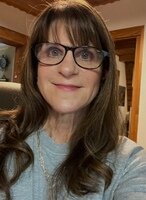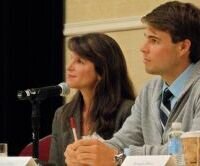Contact Us
Do you need to contact us, or do you have questions about the Donor Sibling Registry website? Find the answers here — including a Q&A with Wendy.
Mailing Address
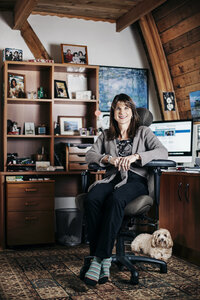
Donor Sibling Registry
PO Box 1571
Nederland, CO 80466
Questions About the Site
If you are having problems accessing your account, please use our login tools to recover lost usernames and passwords.
Make sure to always have an up-to-date email address listed on the DSR, and please, never sign up with a second username — either the site can send you your password, or just email Wendy to reset it!
For all other issues, please consult our Site Help page to see if the answer to your problem has already been provided.
If you have any other issues regarding the usability or functionality of the site, please email Wendy at wendy@donorsiblingregistry.com.
Click here to join our "Private" Facebook page (for chatting, news, and support).
Contact Wendy Kramer (Including expert witness testimony.)
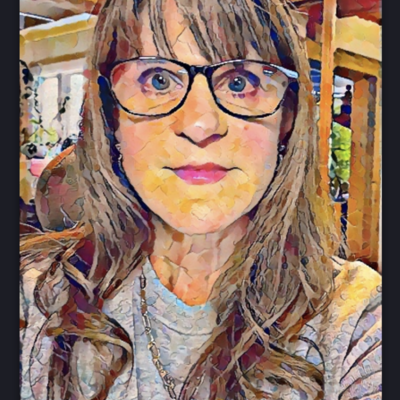
Wendy's Psychology Today monthly articles
Press Inquiries
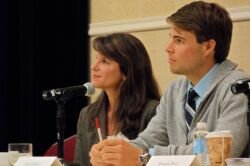
The DSR is the creation of Wendy and Ryan Kramer, who are open to any and all media/press inquiries about the site, as well as personal correspondence from those seeking information or education about donor offspring/sibling issues.
Wendy and Ryan's story:
Donor Family Matters: My Story of Raising a Profoundly Gifted Donor-Conceived Child, Redefining Family, and Building the Donor Sibling Registry
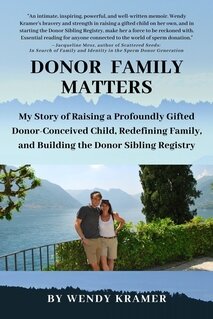
Q&A with Wendy
This Q&A is from a 2008 interview with Wendy Kramer. [Some stats have been updated.]
My son always knew that his donor had signed up for anonymity and that the chances of ever meeting him were slim. So when he found out that he did indeed have half brothers and sisters out there, (children also conceived from the donor that I used), he wanted to know them and wondered if they also had any interest in knowing him. His thinking was that even if he never got to know his donor, he might be able to experience that "invisible" part of himself in these half-siblings. The site was therefore created as a place to be found. Respecting donors' privacy and their right to remain anonymous, if that was their original agreement, was important to my son, so he wanted a place where he (and others) could make themselves available to be found.
We hear from sperm banks all the time that these donors were promised anonymity, and they should not be sought out. So, the most surprising thing to me was that donors started coming to our website and registering. Many of them are very interested in connecting with offspring. Many feel that they never had a choice about anonymity, and most were never properly educated about what being a willing-to-be-known donor actually meant. Some have had a change of heart over the years, as they realize what contact might mean for those who they helped to create. Many are curious. Many have children who want to know their own half-siblings. We currently have more than 4,400 egg and sperm donors who are on the site, willing to make themselves available for contact. We never dreamed that so many donors would be willing to register on the DSR.
The industry. There is a huge disconnect between the industry and the families that they are helping to create. They are very slow to appreciate the importance of donor-conceived people making connections with their half-siblings and/or their donors. They have refused to adequately educate recipients and donors at the front door so that they can make truly educated choices about donating and accepting donated sperm. They have also been neglectful in regards to addressing donor families needs out the back door. Achieving pregnancy is not the end of the story! The banks are responsive in regards to helping people get pregnant, but then do not offer support to donor-conceived people wishing to gain more information on their genetic and ancestral history. Most will not facilitate mutual consent contact. They do not adequately update medical records and share important medical information. They do not accurately monitor (or limit) how many children are born from any given donor. And some sperm banks, like Fairfax and CLI, refuse to give donors their own donor numbers, thereby actually prohibiting donors from connecting with families. Some sperm banks, like NW Cryo/California Cryobank, have threatened people for testing their own or their childs DNA.
I heard an interview recently where California Gov. Jerry Brown said this, "First you have a desire, then a need, then a right, and then finally, a law." We can apply this idea to donor-conceived people and their right to know about their ancestry, genetic relatives, and medical history, and maybe someday a law that serves their best interests.
More than three-quarters of our surveyed donor offspring would recommend that prospective parents use a willing-to-be-known donor. So please, do not choose an anonymous donor. Why bring a child into the world who will have no chance to ever know their donor or anything about that "invisible" side of themselves — their ancestry and their genetic/medical background? Would you want your child to one day say, “If you could have chosen a donor that I would have had the chance to know someday, why didn’t you?” Not all donor-conceived children are curious, but you don't know if you will have one who is. Please, educate yourself on the clinic or sperm bank you are about to use. Find out if they are responsive to families' needs post-pregnancy. Be honest with your child and disclose the truth about their conception right from the start. And please, honor your child's curiosity and right to search, find, and connect with their biological family.
Some sperm banks offer "open" or "willing-to-be-known" donors, which means that a child might have the opportunity to meet their donor when they are 18. I feel that 18 is an arbitrary number, only in place to protect the sperm bank's liability. Evidence of thousands of donor-offspring connections on the DSR shows us that if a donor and a child (and their parents) are willing to make mutual consent contact before a child is 18, that can be an extremely enriching experience for all involved. My son Ryan met his donor and grandparents when he was 15, and it was an extremely positive experience of expanding our families!
I know that the work that the DSR does is making a difference in people's lives. Each time I hear a heart-warming story of connection between half-siblings or a donor-conceived person and their biological parent, it makes me know that what we are doing is worthwhile and valuable. Each family that I hear from that has decided to tell their child the truth, or choose a "known" as opposed to an anonymous donor, or thinks seriously about donating eggs or sperm because of what they read on the DSR — it lets me know that as a community, we can influence decisions and lives.
The industry is unregulated and is in dire need of some sort of oversight. We have many sibling groups of 20, 40, 60, and up to 205 on the DSR. No one is tracking or knows how many donor-conceived people have been born. Our research shows that between 22%-27% of sperm donors donate to more than one facility. No one is tracking, updating, and sharing vital medical information. Thank goodness many of these families can share medical information with each other on our site. No one in the industry is properly educating parents-to-be or donors. No one is addressing the needs of the donor-conceived. No one is tracking egg donors health histories. We have partnered with prestigious academic institutions all around the world, like Cambridge University in England, and have been conducting and publishing many full-scale studies of donor families, because the infertility industry has just not done so. We hear that the industry would prefer to self-regulate. The reproductive medicine industry has been aware for years about the large groups of half-siblings, yet we see no movement towards updating their record-keeping — only a continued dismissal of the research being published.
Although I am unsure of how the government would do at such a task. Maybe a group consisting of government representatives, industry representatives, therapists, bio-ethicists, donor-conceived people, parents, donors, and other interested parties. I believe we should look to other countries who have regulated and see what has worked and what can be improved upon within their systems.
I am very clear about the problems ... but not so certain about the solutions.
The word gamete is used in a clinical setting for the egg or sperm product that is sold to the bank and then purchased by prospective parents who need it. The term may make it easier for some parents to think of it as simply a cell, or an item of genetic material, and nothing more. But I know very well, from my own son and from the many other offspring I’ve talked to over the years, that this may not be how they think of it. Many kids do accurately think of that “cell” as one half of their genetic background and heritage. Much more than a just clinical product.
So my biggest piece of advice to parents is to let your kids choose for themselves how they define the donor in reference to their life.
My greatest fear is that a child who is told that the donor did nothing more than donate a “cell” grows up unable to express their true thoughts, curiosities, and feelings on the matter. I’m not a psychologist, but I know this kind of suppression is not healthy — for the child, or for the parent-child relationship.
Again and again, we have heard on the site from donor-conceived adults who have a strong desire to understand this invisible side of themselves. We have heard numerous stories of donor-conceived kids and adults who connect with their donor relatives, either half-siblings or donors, and report it as a profound and meaningful experience. These people are acknowledging — sometimes even confessing — a genetic bond that is important to them. That’s why I urge parents to allow kids to decide for themselves. To make sure the child doesn’t perceive normal curiosity as betrayal, or hurtful to the parent. Just because parents feel one way about donor conception in no way guarantees that their children will feel the same way. Please let the discussion and decisions on genetic importance be child-driven over time.
If parents feel a sense of shame about using a donor, or haven't fully processed their own infertility, or grief about not being genetically related to their child, then they risk passing along these unresolved feelings to their child. These are issues that parents need to resolve BEFORE their child is born. That way they can fully support their child with any curiosities they may have about their first-degree, unknown genetic relatives. Too many donor-conceived people come to the DSR behind their parents' backs, afraid of hurting them. These parents then insist that their children are not curious — a real disconnect.
Yes, fear is the main reason couples don’t tell. Shame about infertility is another. A large number of non-biological parents (men and women) believe it stigmatizes the relationship — or at least their standing in the family — if people know that someone else was required to create that child. This is a very understandable, common concern. But for a parent to relegate their importance in the family as being related to whether they can produce sperm or egg to fertilize an embryo is really, when you think about it, a secondary role. I do understand how ego plays a part in these decisions. And it’s easy for me to say that it shouldn’t matter, since I was able to produce an egg that contributed to my son’s birth.
Yet if you ask my son today whether my egg was important to him in terms of my standing as his mother, he would absolutely laugh out loud. And if you ask the people around us whether my egg is the reason I am important in my son’s life, they would look at me as if I had lost all sanity.
Our reproductive “goods” have absolutely nothing to do with our role as parents. And to think otherwise is a demeaning position — for ourselves, our partners, and our children.
It might seem contradictory that lack of biological connection means nothing in our parent-child relationship, yet the biological connection to the donor might mean so much to our child. But that’s exactly the point. A donor is not important to the child in the way we tend to think. As parents, we’re off the mark when we think our child wants to find something in the donor that he cannot find in us. Really, we’re irrelevant to the story. Our children want to find connections with donors as extensions of themselves, not as extensions of their parents. They have parents. What they don’t have, as fully as they would like, are answers related to their very personal and individualized self-identities. They want to know about their paternal (or maternal) ancestry and medical backgrounds. That’s something we cannot give them. Only the missing donor can.
A child who doesn’t look like his mother or father, and doesn’t share some of the same elusive genetic mannerisms, will just as easily wonder why he or she feels unconnected. Many donor-conceived kids who learn the truth as adults are actually relieved to have an explanation for something they couldn’t understand earlier. And then, as adults, they simply have a stronger round of emotions to get through about why their parents didn’t respect them enough, or trust them with the information in the first place. Adults who find out about being donor-conceived can feel a great sense of betrayal and anger. I recommend starting the story when your child is a baby before they can even understand the words. Then it just becomes a part of their story and a part of who they are.
My goal with the DSR organization is simply to help educate those considering using donor conception, those considering donating, and those of us who made decisions long before we were aware of the true ramifications so that we can better serve the needs of not only our children but also those to come. Also, we want to have a safe place for donor-conceived people to educate us about their needs and issues.
I realize that these discussions can sometimes be uncomfortable. It’s an emotional area, and we all have different backgrounds and values to respect as we make our own decisions about what is the right thing to do in our own families. But we all deserve the right to make educated decisions.
But one thing I do recognize is that the donor industry has so far belittled or neglected or forgotten the rights of the children being born. This is a very important debate and until we bring it up for examination, not only among ourselves as donor-conceived families, but in the larger public eye, the industry in the United States, and around the world, will not make any progress.
And I do strongly feel, as did people in the adoption industry before us, that the industry does need to make changes.
Many parents are asking for them. Some donors are also asking for change. And more importantly, many donor-conceived people are asking for change. That’s why I’m looking to help them build a stronger, collective voice so that there can be greater impact for the most basic questions we should be talking about. Some parents and some offspring do have different perspectives on what is important to them. We do need to respect the fact that not everyone will agree. But agreeing to disagree is very different from not having the collective conversation at all. Of course, the medical establishment isn’t going to lead the discussion. They have no incentive to do so. That’s why the kind of conversations that happen on the DSR and through research, outreach, and media that we initiate can be perceived as very threatening to them — stirring up debate in an industry that has otherwise been very content to exist on a secretive, private terrain. The thinking among many in the medical establishment that I’ve talked with is that if it’s not broken, why fix it? But of course, it IS broken. Many of our kids do suffer from our choices because we usually aren’t thinking them through the way we should. It’s that “thinking things through” process that I’m hoping to keep facilitating. I’m not trying to make decisions for families. My goal, really, is to bring up the things I’ve learned and enable others to do the same so that parents can make educated choices.
Without a doubt, it’s the shame factor. Unconsciously or not, parents can make it so much more difficult for their children to feel pride about their birth. Obviously, our children were wanted. Parents wouldn’t go through the steps they do, with something as costly as reproductive technology, if their children were not greatly desired. Yet even a child who doesn’t know he was donor-conceived is going to be denied that truth because the parents feel shame or fear or some other negative emotion. And maybe it doesn’t feel that way to the parent. Maybe they genuinely do feel they are protecting their child. Maybe their strong love for the child after birth makes it more difficult to tell the truth later on, for fear of spoiling the attachment or adding an artificial ingredient to something that is so powerful a bond. But in my view, it’s never healthy to mislead your child. Family secrets are always toxic.
In my view, the parent who feels shame about infertility cannot help but project that shame onto the child. In my view, the couple who feels an imbalance as parents, because one is biologically connected and the other not, have far greater issues to discuss than non-disclosure to the child can cure.
The parent who holds the perspective that biology is more important than honesty is short-changing the parenting responsibility. I do have personal experience with several people who are withholding the truth, for various reasons, and it is so foreign to me that I admit I have trouble accepting it. Especially when it relates to my son and his half-sisters. I’ve had contact with the mother of two of Ryan’s half-sisters. The resemblance between her daughters and my son was so strong that she knew after seeing him on TV, without knowing our donor ID number, that they were half-siblings. But she and her husband have no intention of telling their children, who are a few years younger than Ryan, that they were conceived from donor sperm. In 2017-2019 Ryan has welcomed 10 more half-siblings into the group, 9 of whom had no idea they were donor-conceived. DNA test results have been shocking.
One half-sister, Ryan’s age, put a message out on the Internet in search of her donor in 2005. She had just been told the truth by her mother, as a teenager, and had a natural curiosity. Someone we know saw the girl’s message and sent it to us. Ryan emailed the girl and they enjoyed chatting with each other online, finding many things in common. But after the girl mustered up the courage to tell her mother of the contact, with a note from me in support, the mother took away her cell phone and email account and forbid her to communicate with Ryan. So once again, Ryan had to work through the anger, frustration, and sadness of knowing that there is a half-sibling out there that he cannot know. And why? Trying to understand the threat that Ryan was to that family. Ryan is a good, kind-hearted person. He would be a positive influence in any half-sibling’s life. This is clearly not about “who” Ryan is, but “what” Ryan is. It hurts me so deeply that my son would be a cause for shame in another family. Such a cause for shame that he is not to be known, and not to be mentioned.
Every day I hear the most amazing stories from DSR members about finding one another. Because of secrecy and shame, this is not so for many on the DSR. The message that Ryan’s half-sister from 2005 was getting is that somehow the methodology of her conception was shameful. This can be internalized so that a person believes that they are worthy of shame. It’s infuriating to me. As parents of DI kids, don’t we owe it to our kids to acknowledge their curiosity and honor their innate right to this curiosity? Why is this so threatening? If the parent is ashamed of having used donor conception, why punish the child with this shame? It’s something I simply find frustrating, and hard to understand.
Finding biological family, including donors and half-siblings, adds to a child’s world — it doesn’t subtract. I strongly believe our decisions as parents should be made with the best interests and the rights of the child in mind, not the fears of the adults.
Let's just say, for argument's sake, that the numbers of donors did decrease. Do the ends always justify the means? Does a parent's right to have a child trump a child's right to know where they come from? We don't have enough organ donors in the US either, but does that give us the right to resort to unethical measures to ensure that we have enough hearts or livers for those that need them? So if there were to be a donor shortage, I believe that this outcome would be more desirable than current practice whereby we are creating children who will have no access to their ancestry, medical background, or genetic relatives. We shouldn't sacrifice ethics for a parent's right to have a child.
Ryan and I support the following objectives:
1. Acknowledge the end of donor anonymity. Many egg clinics and agencies are already writing the DSR into their contracts so that parents and donors are connected right from pregnancy or birth. Sperm banks can do the same. 18 is an arbitrary age (sperm bank liability), as many donor offspring desire to connect long before the age of 18 and we know that thousands of offspring have formed meaningful relationships with their first and second-degree genetic relatives while still children. Why try and keep a child from their genetic parent for 18 years?
2. Track all recipients, donors, and births and safeguard all records in a central data bank indefinitely. Information to be accessible by all involved families.
3. Mandate reporting of donor-conceived live births from each donor.
4. Limit the number of births conceived with the sperm or eggs from any given donor. 10 is what our community feels comfortable with.
5. Require donors to regularly update their family medical history. Medical Information to be shared amongst families.
6. Mandate full genome sequencing for donors. Share information with families.
7. Push our respective governments to inquire into follow-up health histories of egg donors.
8. Require mandatory third-party counseling for all prospective donors and parents.
9. Sperm banks and clinics should properly educate donors about their legal and financial protection so that they feel safe to come forward.
10. Sperm banks and egg facilities need to properly educate donors and parents about DNA testing (along with public records, Google, and social media), and how it has essentially ended the guarantee of anonymous gamete donation. Stop selling every single vial of sperm and every egg as "anonymous", be it for 18 years or forever.

